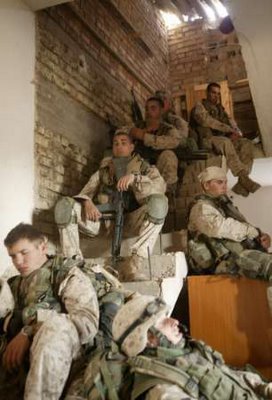An Army Ready to Snap

Go to Original
By Bob Herbert
The New York Times
Thursday 10 November 2005
Have you heard what's been happening to the military?
Most people have heard that more than 2,000 American G.I.'s have been killed in the nonstop meat grinder of Iraq. There was a flurry of stories about that grim milestone in the last week of October. (Since then the official number of American deaths has jumped to at least 2,055, and it continues to climb steadily.)
More than 15,000 have been wounded in action.
But the problems of the military go far beyond the casualty figures coming out of the war zone. The Army, for example, has been stretched so taut since the Sept. 11 attacks, especially by the fiasco in Iraq, that it's become like a rubber band that may snap at any moment.
President Bush and Donald Rumsfeld convinced themselves that they could win the war in Iraq on the cheap. They never sent enough troops to do the job. Now the burden of trying to fight a long and bitter war with too few troops is taking a terrible toll on the men and women in uniform.
Last December, the top general in the Army Reserve warned that his organization was "rapidly degenerating into a 'broken' force" because of the Pentagon's "dysfunctional" policies and demands placed on the Reserve by the Iraq and Afghanistan wars.
As one of my colleagues at The Times, David Unger of the editorial board, wrote, "The Army's commitments have dangerously and rapidly expanded, while recruitment has plunged."
Soldiers are being sent into the crucible of Iraq for three and even four tours, a form of Russian roulette that is unconscionable.
"They feel like they're the only ones sacrificing," said Paul Rieckhoff, a former Army lieutenant who served in Iraq and is now the executive director of Operation Truth, an advocacy group for service members and veterans.
"They're starting to look around and say, 'You know, it's me and my buddies over and over again, and everybody else is living life uninterrupted.' "
When I asked Mr. Rieckhoff what he thought was happening with the Army, he replied, "The wheels are coming off."
The Washington Post, in a lengthy article last week, noted:
"As sustained combat in Iraq makes it harder than ever to fill the ranks of the all-volunteer force, newly released Pentagon demographic data show that the military is leaning heavily for recruits on economically depressed, rural areas where youths' need for jobs may outweigh the risks of going to war."
For those already in the Army, the price being paid - apart from the physical toll of the killed and wounded - is high indeed.
Divorce rates have gone way up, nearly doubling over the past four years. Long deployments - and, especially, repeated deployments - can take a vicious toll on personal relationships.
Chaplains, psychologists and others have long been aware of the many dangerous factors that accompany wartime deployment: loneliness, financial problems, drug or alcohol abuse, depression, post-traumatic stress disorder, the problems faced by the parent left at home to care for children, the enormous problem of adjusting to the devastation of wartime injuries, and so on.
The Army is not just fighting a ruthless insurgency in Iraq. It's fighting a rear-guard action against these noncombat, guerrilla-like conditions that threaten its own viability.
There are reasons why parents all across America are telling their children to run the other way when military recruiters come to call. There are reasons why so many lieutenants and captains, fine young men and women, are heading toward the exit doors at the first opportunity.
A captain who is on active duty, and therefore asked not to be identified by name, told me yesterday:
"The only reason I stayed in the Army was because one colonel convinced me to do it. Other than that, I would have walked. Basically, these guys who are leaving have their high-powered educations. Some are from West Point. They've done their five years. Why should they stay and go back to Iraq and die in a war that's just going to keep on going?"
Beyond that, he said, "Guys are not going to stay in the Army when their wives are leaving them."
From the perspective of the troops, he said, the situation in Iraq is perverse.
He could find no upside. "You go to war," he said, "and you could lose your heart, your mind, your arms, your legs - but you cannot win. The soldiers don't win."
Link Here




0 Comments:
Post a Comment
<< Home